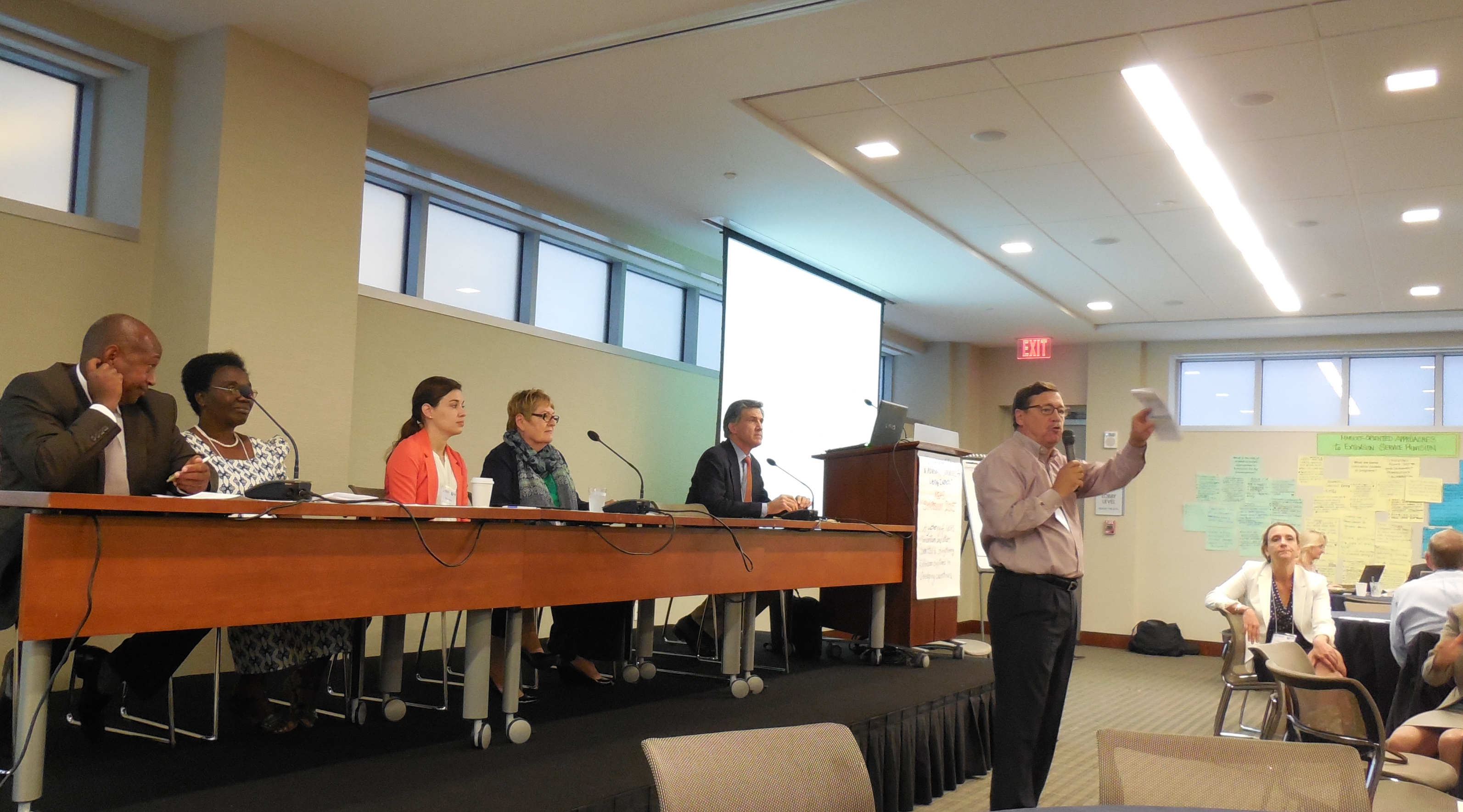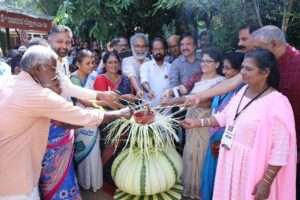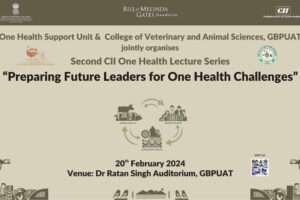MEAS organized this symposium to share and discuss the findings of various MEAS funded projects from different countries. Dr P.V.K. Sasidhar who participated in this meeting shares his experiences here.
CONTEXT
Extension systems worldwide need to undergo significant change if they are to effectively serve the food security and economic development needs of resource-poor men and women farmers. New approaches must draw on the strengths of public, private and civil society organizations and must utilize available advanced information and communications technologies. The MEAS (Modernizing Extension and Advisory Services) projects objective is to identify and disseminate efficient, effective and financially sustainable extension and advisory services (EAS) in selected countries, so that they play a key role in both, increasing farm incomes and enhancing the livelihoods of the rural poor, especially farm women.

As the MEAS http://www.meas-extension.org project comes to a close, over 150 participants, which include consortium leaders and key project partners from over 25 countries converged in Washington, D.C. to consolidate the knowledge gains made by the project and reflect on its role for the future of extension and advisory services (EAS). Over a period of two and half days, the meeting reviewed the main lessons learned and celebrated the successes the MEAS has achieved in the past five years.
OBJECTIVES OF THE MEETING
- How can we best strengthen extension and advisory services (EAS) in developing countries in order to reduce poverty and increase food security?
- What are the lessons from the MEAS experience and the experience of partners around the world?
- How can we sustain impacts to result in improved services for small-holder farmers, especially women farmers?
THE PROGRAMME
Day-One: 3rd June 2015
The meeting started with a brief opening ceremony, welcome and presentation of objectives of the meeting. This was followed by two keynote presentations.
Keynote Presentations
Presentation 1: The Role of EAS in the Feed the Future Initiative
This presentation by Susan Owens from USAID focused on the importance of supporting small holder farmers to feed the future generations. The presentation also touched upon issues such as future of EAS, value chain development, enabling policy support, inclusiveness of women and smallholders, strengthening linkages and integrating nutrition into EAS.
Presentation 2: The Imperative of Extension
This keynote address from MEAS Director, Paul McNamara focused on lessons from recent MEAS projects. Key issues such as the importance of investing in extension and the major challenges in extension provision were also discussed in the presentation.
These two keynote addresses set the background for the rest of the two and half days meeting. This was followed by presentations of leading issues under two panels. 
Leading Issues – Panel I Presentations
- Encountering Pluralism
- New Extensionist – Roles and Capabilities to strengthen Extension
- Pluralism in Latin America -FAO’s strategy for strengthening EAS
- The View of Apex Organizations in
Africa
The presentations and discussion under these themes touched upon various issues like challenges in pluralistic EAS delivery; responsibilities of different actors under a pluralistic extension system (especially in Latin America and Africa); roles and responsibilities of the new extensionist – (generalist vs. Specialist; technical vs. functional skills); core competencies for the extension profession, etc.
Leading Issues – Panel II Presentations
- Capacity Development
- Gender Integration
- Nutrition Integration
- Adoption Scaling
- Climate Change Adaptation
The presentations and discussion under these themes covered issues and experiences related to continuous education and capacity building of EAS providers; need for integration of gender and nutrition issues in EAS; using what we know about human behavior in the diffusion of agricultural innovation; and the role of EAS in scaling-up, rural livelihoods and natural resources in rain fed agriculture (in the context of adaptation to climate change).
This was followed by two technical sessions and discussion.
Session –I: Private Sector and Development Organizations’ Approaches to EAS Provision In this session the following presentations were made on EAS delivery in private sector.
- Examining Private Sector Led Extension Approaches
- Development Organizations’ Approaches to EAS
- Financial Advisory to Strengthen Local Agriculture Enterprises
- EAS under National Cooperative Business Association – CLUSA International
The first presentation was a summary of the workshop on ‘Examining Private Sector led Extension Approaches’ held on June 2, 2015 in Washington, D.C. The focus of the workshop was on various approaches being used by private sector led extension initiatives and publicprivate partnerships (PPP) which are rapidly expanding worldwide. The focus of other presentations was on how farmers’ organizations engage in large scale aggregation through contract farming, financial management training (which creates better business processes and promotes better supply chain management).
Session –II: Harnessing the Power of Extension to Transform Gender Roles and Improve Household and Community Nutrition Outcomes
In this session, a total of seven presentations were made focusing on gender roles in improving household food and nutrition security with experiences from different countries on women groups, networking and social capital formation. The session highlighted the importance of recognizing women farmers and delivering programmes directly to them because in most households women are intimately involved in the production and preparation of food for family.
Day Two: 4th June 2015
Session 1: Public Sector Service Provision, Policy Making, and Enabling Environment
In this session the following presentations were made on public sector service provision, policy making, and enabling environment.
- Kenya’s Agricultural Extension Services – Issues,Challenges, FuturePerspectives
- Institutional Innovation:
Enabling Decentralized
Extension in Ghana 3. Along the Policy Path:
Reviewing Ghana’s Agricultural Extension Policy
- Agricultural Extension Policy Formulation in Cambodia: An Overview of the Process
- Agricultural Extension Services in Malawi Past, Present and the Future
- Georgia—Not Following the Crowd
- GFRAS Policy Compendium
The presentations outlined the challenges under public sector EAS provision which includes, declining human and financial resources; uncoordinated/unregulated pluralistic extension services delivery; and poor linkages with other market services. The focus of these presentations was on the approach and methodology for conducting review and consultations on public agricultural extension needs; current delivery structures and extension approaches in different countries; and policy options to improve the effectiveness and efficiency of public EAS. I particularly found the document on ‘Agricultural Extension Policy Formulation in Cambodia’ very interesting.
Session 2: Rebuilding Extension Systems in Transition and Post Conflict Settings
In this session, the following presentations were made on agriculture extension in post-conflict countries (Liberia and Sierra Leone). The focus of the two presentations was on how agriculture-related factors (e.g. poverty and hunger) contribute to conflict in countries and also how extension via agricultural development, can help countries in post war reconstruction. Conflict disrupts agriculture more than any sector. The presenters argued that extension is a central post-conflict development strategy that addresses poverty, livelihoods, and food security and proper EAS promotes stability provided the extension challenges in post-conflict settings are fully recognized and addressed.
Session -3: The Evolving Role of ICT for Extension
The focus of eight presentations under this session was on call center, mobile, farm book suite, and radio based ICTs. Experiences from countries such as Ghana, Kenya, Bangladesh, Tanzania and Myanmar were presented in this session.
Session-4: Strengthening the Role of Farmer-to-Farmer Extension and Farmer Organizations in Extension
In this session the following presentations were made.
- Farmer Organizations and Demand-Driven Extension
- Farmer-to-Farmer Extension: The Quiet Transformation
- Participatory Extension Experiences from Latin America
The presentation on farmer organizations stressed the importance of working with farmer groups for strengthening farmers’ capacities to engage in a wide range of rural development activities. Investment in EAS also enhances the capacity of groups to make effective demands on service providers, apart from widening the range of services offered to farmers.
On farmer to farmer extension, the presentations revealed that development organizations extensively use farmer to farmer extension in Malawi and Cameroon. However the lessons from these experiences are not being documented. MEAS project assessment in Cameroon, Kenya and Malawi has documented aspects relate to the following: how organizations select, train, and reward farmer trainers; organizations’ and farmers’ views on effectiveness, and; ways to enhance effectiveness and sustainability of farmer to farmer extension.
Day Three – 5th June 2015
Session -1: Capacity Development: Needs and Ways to Address Them In this session the following presentations were made.
- Public-Private Partnership for Responsive Extension Education
- Confronting the Challenge of Agricultural Education and Training
- Building Capacity to Integrate Gender into International Extension Programs
Experiences related to strengthening extension curriculum (in undergraduate and graduate agriculture education programmes) to build the capacities of future EAS providers were shared through these presentations.
Session – 2: Building the Value Case for Extension
There were four presentations in this session building the value case for EAS at macro level. The argument in all the presentations was on how to build cost effective and evidence based extension in order to meet the emerging challenges.
Small Group & Round Table Breakout Sessions
During the two and half days meeting, there were several small group and round table breakout sessions on the following topics and focus questions.
- Small Group Breakout Session – Harnessing the power of extension to transform gender roles and improve the household and community nutrition outcomes
Focus questions
- The Recommended Action -‘The What’
- Target Actors – ‘The Who’
- Implementation – ‘The How’
- Small Group Breakout Session – Market Oriented Approaches to Extension Service Provision
Focus Questions
- What should be the approach for agriculture development?
- What are some of the innovative models or programmes?
- What are limitations / challenges to market oriented approach?
3. Round Table Breakout Session Focus Questions
- How can we best strengthen extension systems in developing countries to reduce poverty and increase food security?
- What are the lessons from the MEAS experience and its partners around the world?
- How can we sustain improved extension services for small-holder farmers, especially women?
Closing Session: The Way Forward for Extension & Advisory Services As closing remarks the MEAS project core team noted the following:
- MEAS project is largely successful in building partnerships in different countries.
- MEAS project engaged with policy makers and was successful in developing extension policies in few countries.
- Evidence on the past five years of MEAS work indicates that now extension is emerging as a priority in many countries and it is now demanding more resources for a better and pluralistic EAS
- The MEAS project has examined several good examples of scaling up EAS models.
WHAT I LEARNT
The symposium gave me an opportunity to understand the extension challenges and problems in EAS delivery in over 25 countries and how these are being addressed. The symposium also provided me an occasion to share our project findings on ‘Integrated Contract Broiler Farming: An Evaluation Case Study in India’ with other project partners.
MY IMPRESSIONS
This was a very well organized meeting with 150 participants representing more than 25 countries. The participants made short power point presentations which had rich content. The breakout sessions provided participants time and space to discuss their views in more detail and the MEAS staff organized every aspect related to planning and implementation of this meeting extremely well.
The case studies, evaluation reports, action research pilot projects, country studies, seminar / symposia outcomes etc are available in MEAS website (http://www.meas–extension.org). These resources are intended to stimulate discussion among governments, policy makers, and EAS providers and help them understand how scaling-up these initiatives can lead to innovation for agriculture development.
Dr. P.V.K. Sasidhar is Associate Professor, School of Extension and Development Studies, Indira Gandhi National Open University (IGNOU), New Delhi-110068 (India).
E-mail: pvksasidhar@ignou.ac.in





Add Comment